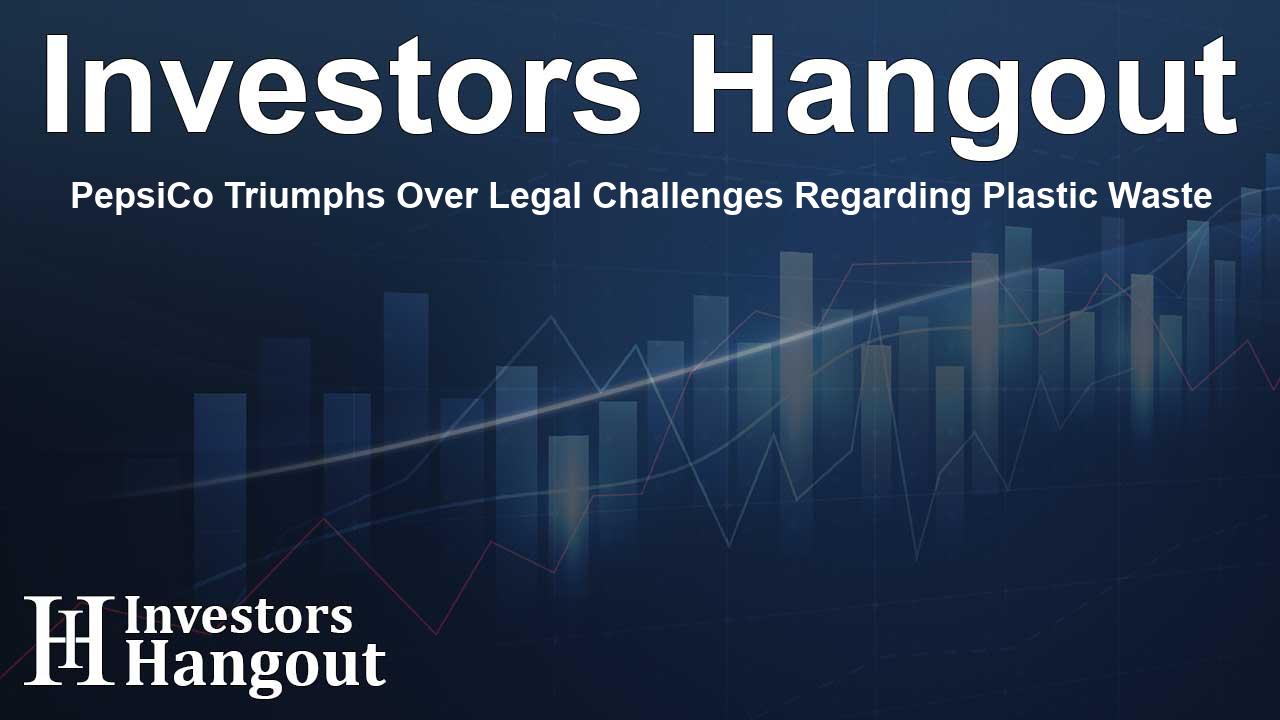PepsiCo Triumphs Over Legal Challenges Regarding Plastic Waste

PepsiCo's Legal Victory Against Plastic Pollution Accusations
PepsiCo (NASDAQ: PEP), the renowned beverage and snack-food company, has recently achieved a significant legal victory in a case brought by New York's attorney general regarding plastic pollution. The lawsuit accused PepsiCo of contributing to the environmental crisis through its extensive use of single-use plastic packaging. However, the ruling favored PepsiCo, highlighting important legal and ethical considerations surrounding environmental accountability.
Overview of the Lawsuit
This lawsuit, initiated by Attorney General Letitia James, focused on the allegation that PepsiCo and its subsidiary, Frito-Lay, were responsible for generating a substantial portion of the plastic waste affecting local waterways, particularly the Buffalo River. With claims that PepsiCo accounted for 17% of the plastic waste in this area, the suit portrayed the company as a significant environmental offender, potentially endangering the local water supply.
Judge's Critique of the Attorney General's Claims
Justice Emilio Colaiacovo, presiding over the case in the New York Supreme Court in Buffalo, sharply criticized the attorney general's approach. He ruled that the evidence presented did not substantiate the claim that PepsiCo was creating a public nuisance. Colaiacovo remarked that it was the individuals who disregard littering laws, not the corporation itself, that should be held accountable.
The Legal Precedent Argument
During the hearing, Justice Colaiacovo referenced a previous case involving Sturm Ruger, emphasizing the judiciary's reluctance to impose liability on companies for actions committed by third parties. This reticence is essential to prevent a slippery slope of lawsuits that can burden the justice system with unfounded claims. His comments shed light on the delicate balance between corporate responsibility and the behavior of consumers.
Implications of the Court's Decision
The court's ruling signals a vital message regarding the standards required to hold corporations accountable for environmental issues. This dismissal not only reinforces the principle that legislatures and not courts should shape environmental policy, but it also emphasizes the necessity for credible evidence to support claims against companies.
PepsiCo's Commitment to Recyclability and Sustainability
In response to the ruling, PepsiCo expressed satisfaction, reaffirming the company's dedication to sustainability and effective recycling. The company believes that collaborative efforts among stakeholders, rather than legal battles, are the most productive methods to tackle plastic pollution effectively.
Broader Context of Environmental Litigation
This lawsuit is part of a broader trend, where various governments and environmental organizations have directed their focus on major corporations that utilize plastic materials extensively. Similar litigations across the nation highlight the urgent need for companies to adopt sustainable practices or risk facing legal repercussions.
Future of Plastic Regulations and Corporate Responsibility
The conversation surrounding plastic use and environmental protection will likely continue to grow as public awareness increases. Companies like PepsiCo will need to navigate these challenges carefully, balancing commercial interests with the expectation of ethical environmental practices. This legal case serves as a pertinent reminder of the complexities involved in safeguarding our environment while managing corporate operations.
Frequently Asked Questions
What was the lawsuit against PepsiCo about?
The lawsuit accused PepsiCo of polluting the environment with single-use plastic packaging, claiming the company was responsible for a significant portion of plastic waste found near the Buffalo River.
What was the outcome of the lawsuit?
The lawsuit was dismissed by Justice Emilio Colaiacovo, who criticized the attorney general for failing to prove that PepsiCo created a public nuisance.
How does this ruling affect PepsiCo?
The ruling allows PepsiCo to continue its operations without legal penalties from this lawsuit, while also reinforcing the company’s stance on environmental sustainability.
What are the implications of the judge's comments?
The judge's comments emphasize the need for credible evidence in environmental litigation and caution against burdening the judicial system with unfounded lawsuits.
What initiatives does PepsiCo have in place regarding plastic waste?
PepsiCo has expressed a commitment to reducing plastic waste through effective recycling and collaborative efforts with stakeholders to find sustainable solutions.
About Investors Hangout
Investors Hangout is a leading online stock forum for financial discussion and learning, offering a wide range of free tools and resources. It draws in traders of all levels, who exchange market knowledge, investigate trading tactics, and keep an eye on industry developments in real time. Featuring financial articles, stock message boards, quotes, charts, company profiles, and live news updates. Through cooperative learning and a wealth of informational resources, it helps users from novices creating their first portfolios to experts honing their techniques. Join Investors Hangout today: https://investorshangout.com/
Disclaimer: The content of this article is solely for general informational purposes only; it does not represent legal, financial, or investment advice. Investors Hangout does not offer financial advice; the author is not a licensed financial advisor. Consult a qualified advisor before making any financial or investment decisions based on this article. The author's interpretation of publicly available data shapes the opinions presented here; as a result, they should not be taken as advice to purchase, sell, or hold any securities mentioned or any other investments. The author does not guarantee the accuracy, completeness, or timeliness of any material, providing it "as is." Information and market conditions may change; past performance is not indicative of future outcomes. If any of the material offered here is inaccurate, please contact us for corrections.








